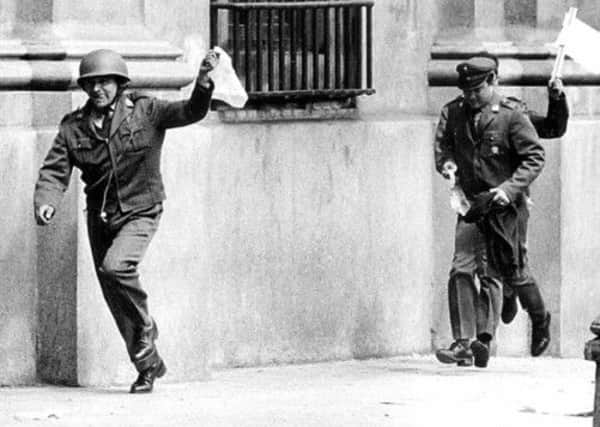Chile: Allende legacy lives on 40 years after coup


With troops closing in on the national palace, Allende avoided surrender by shooting himself, ending Chile’s experiment in peaceful revolution and beginning 17 years of dictatorship.
Today, a socialist is poised to reclaim the presidency and a new generation, born after the return to democracy in 1990, has taken to the streets in vast numbers to demand the sort of social goals Allende promoted.
Advertisement
Hide AdAdvertisement
Hide AdHis daughter, Senator Isabel Allende Bussi, said: “Forty years after, he is mentioned more than ever by the young people who flood the streets asking for free, quality education.”
Chileans have more recently focused their anger on the costly university system installed under Pinochet, and on the vast gap between rich and poor that resulted from his free-market economic policies.
Allende became the first elected Marxist leader in the Americas in 1970, though he won just 36 per cent of the vote and faced a hostile Congress.
The embracing of socialism was a Cold War nightmare for United States president Richard Nixon, who approved a covert campaign to aggravate the country’s economic chaos and helped provoke the military takeover.
The coup initially was supported by many Chileans who were fed up with inflation that topped 500 per cent, chronic shortages and factory takeovers.
But Pinochet shut down Congress, outlawed political parties and sent security forces to round up and kill suspected dissidents.
The list of people killed, tortured or imprisoned for political reasons during his regime totalled 40,018. The government estimates 3,095 were killed, including about 1,200 of whom no trace has ever been found.
Pinochet also cut short Allende’s reforms. He cut funding to schools, privatised pension and water systems, returned land to former owners, trimmed wages and slashed trade barriers, building a free-market model credited with Chile’s fast growth and institutional stability.
Advertisement
Hide AdAdvertisement
Hide AdThe string of mostly left-leaning governments that followed have left the core of Pinochet’s system – and even his constitution – intact.
Polls indicate that when Chileans vote for a new president on 17 November, they are overwhelmingly likely to bring back Michelle Bachelet, a Socialist Party member who left the presidency four years ago as Chilean law bans consecutive re-election. She promises to push for the most wide-ranging reforms in four decades, overhauling the dictatorship-era constitution.
“The right has tried to put the focus on economic reforms, the modernisation of the state and the economy as Pinochet’s greatest legacy,” said Ricardo Brodsky, director of the Museum of Memory, where TV screens endlessly show footage of the bombing of the presidential palace.
“But to Chilean society today, the greatest legacy of Pinochet remains the human rights violations, the disappeared and the dead.”